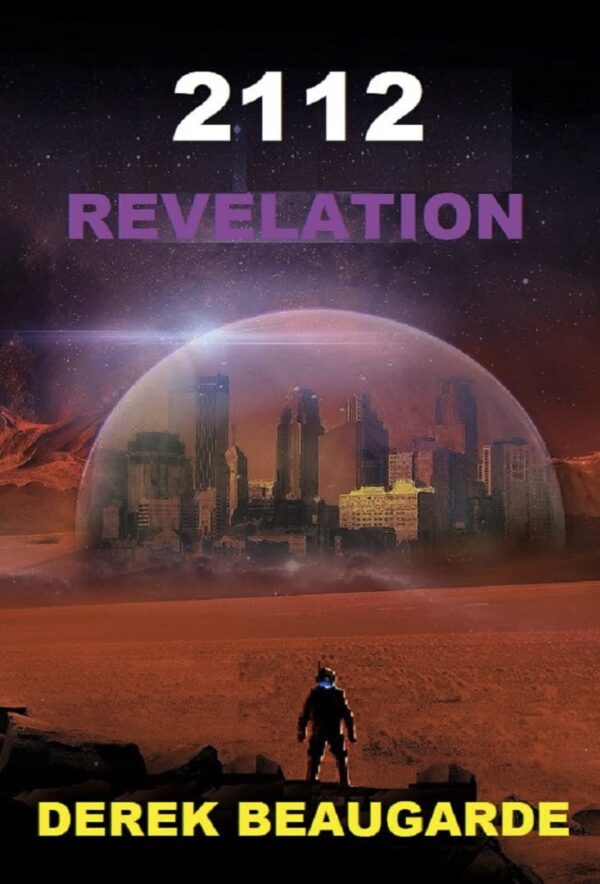Genre: Sci-Fi
Reviewer: Lucy
Get It On Amazon
About The Book
In 2084, Planet Earth was utterly destroyed by a rogue comet and around 25,000 surviving humans were transported to Capitol Base on Mars. These humans included Ewan and Jill Sinclair. Their son Jack Crossan Sinclair is the first Martian child born on Mars and graduates as a geologist. He leads a project to conduct geological surveys to find extractable mineral resources close to Olympus Mons. However, a powerful and secret pseudo-religious organisation back at Capitol Base makes it their mission to stop Jack, at all costs.
The Review
This was an absolutely fabulous follow up to the first in the trilogy – 2084: The End of Days. In the first book, the Earth is facing extinction because of a catastrophic meteor that is headed its way. With only two years to plan, there’s a lot to do to prepare for a mass exodus of the world’s population.
In this second book, 2112: Revelations. the residents of Mars have had twenty-eight years to establish their community and grow the population. They’re doing all right on the first, having created a city-state under the protective domes that make life on Mars possible. But the population is not expanding the way they’d hoped, and predictions for the future of humanity on Mars looks grim. Against this backdrop, Jack Sinclair, is attempting to explore the surrounding landscape for minerals that are urgently needed for further scientific and manufacturing development. But there are forces at work that try to keep Jack from this seemingly innocuous goal.
2112: Revelation proves that Derek Beaugarde’s writing is firmly rooted in science fiction. There are some common tropes: man has colonized a harsh and unforgiving environment; the population must grow against all odds; there is a conflict between groups or creatures that threaten the survival of humanity in this environment.
But 2112 also has a nice thread of intrigue that reminds me of thrillers like the Davinci Code. Unbeknownst to geologist Jack Sinclair, among the citizens that relocated to Mars are the members of a secret Catholic organization who have zealously guarded a secret for thousands of years. In their minds, the revelation of this secret could mean the upheaval of everything they believe in, and change the fundamental understanding of humanity.
Like the first nook in the trilogy, 2112: Revelation is very well written. The pacing is smooth, so that once the reader has sat down and begun to read, the pages fly and the story progresses without the reader being aware just how much time they’ve spent reading. There were definitely some differences between the two stories, most notably a growth in the writer’s style. Both books use multiple points of view, which I’ve always enjoyed because I get more than one perspective and a better big-picture view. It also lets the reader see the impending disaster that’s awaiting the main character, who is typically unaware of the peril.
In 2084: The End of Days, I was frequently frustrated with a kind of head-hopping where the perspective would change from one character to another in the middle of the chapter, perhaps even from one paragraph to the next. In this book, the author has conquered that tendency, so we get only one character’s thoughts at a time. One of the things I enjoy about reading a series is watching a writer grow in their craft.
Beaugarde takes a familiar trope – humanity trying to survive in an unfamiliar, hostile environment – and gives it his own unique spin. The domed community functions as a city-state, with a president and congress. There are many of the accoutrements of civilization: government, a police force, a university, industrial and scientific endeavors. I would have enjoyed more descriptors of the domed community itself and the landscape surrounding it. But what details we were given were clear and concise.
This story is well-written, with interesting characters, a well developed and smooth plot, a believable premise, and a solid, satisfactory ending. I’m looking forward to reading book three: 2048 BCE: The Eye of Horus.
The Reviewer
I’m an avid reader who loves pretty much all genres except math textbooks. As a kid, my parents exposed me to everything from fairies, hobbits, and dragons to the biographies of interesting people around the world, interspersed with poetry, plays, and music. Into adulthood, I spent a lot of years with my nose buried in various textbooks. Now, I read whatever grabs my fancy.


